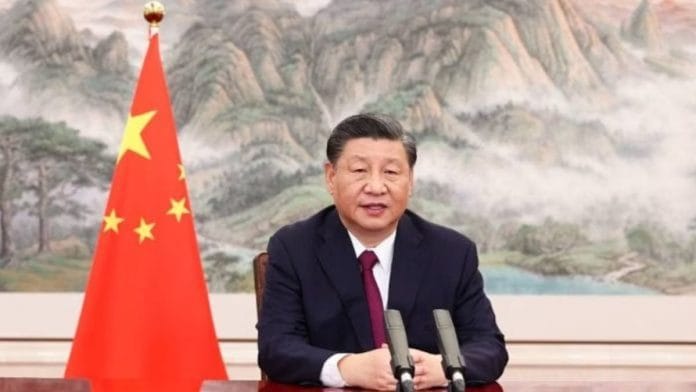The third plenary session of the 20th Central Committee of the Chinese Communist Party is finally underway in Beijing. The session, taking place from 15-18 July, has 205 full members and 171 alternate members in attendance. It aims to address China’s economic problems and boost the country’s modernisation drive.
Held once every five years, the plenum serves as a crucial platform for announcing key economic directives and reforms that attract global attention. And it assumes heightened importance against the backdrop of several challenges. These include a downturn in the real estate sector, ongoing efforts for post Covid-19 recovery, and a notable slowdown in China’s second-quarter GDP growth rate of 4.7 per cent. Additionally, amid US-China trade tensions and American restrictions on technology transfers, it shows that Beijing is strategically pivoting toward greater economic self-sufficiency.
In this session, President Xi Jinping, also the General Secretary of the Central Committee, delivered a work report on behalf of the Political Bureau, outlining priorities for ‘comprehensively deepening reform and advancing Chinese modernisation.’ Central to these policy directives are initiatives to bolster advanced manufacturing, overhaul the tax system to mitigate debt risks, navigate a substantial property market crisis, stimulate domestic consumption, and breathe new life into the private sector.
Chinese media positive about Xi’s leadership
State-owned media is actively supporting Xi’s leadership, portraying him as guiding China through profound social and economic transformations via comprehensive reforms. The People’s Daily emphasised that “the path of Chinese-style modernisation has evolved from reform to the comprehensive deepening of reform, marking a critical juncture.” In strikingly similar language, Xinhua remarked: “Standing at a new historical starting point, we [China] are embarking on another great transformation.”
Expressions like “the ship carries a thousand pounds, with one person at the helm” underscore the Chinese president’s authority while overly emphasising his role. The tangible impact of these policies often seems limited, resembling symbolic gestures. Such an approach avoids accountability, relying heavily on Xi’s cult of personality and the support of his loyalists.
Much of the media asserts that “Socialism with Chinese characteristics” originated during the reform and opening-up era, and that Xi’s continuous reforms in this direction show he is committed to its success. The overwhelmingly positive tone of the plenum and Xi’s leadership portray a narrative that, despite challenges, comrades should trust in his vision and leadership. It suggests that, drawing from the president’s past successes in reform and opening up, he is positioned to guide the country toward even greater prosperity.
Efforts are also being made to highlight how policy guidelines are capturing the attention of foreign media and investors, and to counter assertions that global leaders and businesses now perceive Beijing unfavourably. A commentary highlighted recent visits to China by Hungarian Prime Minister Viktor Orban, Bangladeshi Prime Minister Sheikh Hasina, Vanuatu Prime Minister Charlot Salwai, and Solomon Islands Prime Minister Jeremiah Manel. These visits taking place around the plenum, the commentary read, is evidence that these countries consider China an important [economic] partner.
Chinese scholars and economists present a nuanced perspective on the current situation. According to Wu Xiaoqiu, dean of Renmin University’s China Academy of Financial Research and president of the China Capital Market Research Institute, a robust institutional framework aligned with modern market principles, stable taxation policies, and a favourable international environment is essential for sustained economic growth.
When assessing China’s economic landscape, Wu emphasised the importance of recognising both achievements and challenges. He argued that addressing challenges does not undermine past successes but rather seeks effective solutions and paves the way for future development.
Zhang Xiaoyan, chair professor of finance at Tsinghua University’s PBC School of Finance, has forecasted that China will progressively open its financial markets to attract foreign institutional investors. She has underscored the pivotal role these investors’ international perspectives and investment expertise will play in channelling significant resources toward technologically advanced companies.
There is a resounding consensus among Chinese economists that to effectively bolster market confidence, the government must prioritise providing clear political signals and establishing a stable legal framework. These foundational pillars are seen as indispensable for fostering a robust economic environment, encouraging investment, and ensuring sustained growth.
Also read: What do Chinese think of Beijing-Moscow partnership? Russia is both ‘comrade and problem’
Reality vs projection
While premature rumours about the Chinese economy’s demise are unfounded, the country faces critical economic challenges that demand immediate attention. Specific policy guidelines and reforms have not been fully disclosed yet, but more than mere praise for Xi is needed, and substantial actions on the ground are imperative. Xi’s leadership and major policy directives often prioritise loyalty displays over genuine accountability. The opacity surrounding these matters further hampers sincere efforts aimed at effective resolution.
China confronts multiple challenges on the foreign policy front, further complicating domestic matters for Xi. The pivotal question remains: can propaganda shield Xi from the economic costs of these pressing domestic challenges?
Sana Hashmi is fellow at Taiwan-Asia Exchange Foundation and George H. W. Bush Foundation for U.S.-China Relations. She tweets @sanahashmi. Views are personal.
(Edited by Zoya Bhatti)






